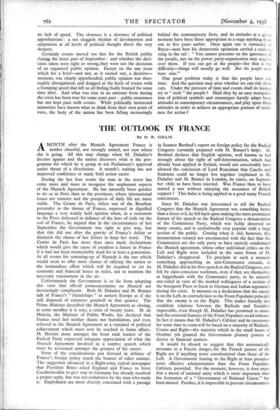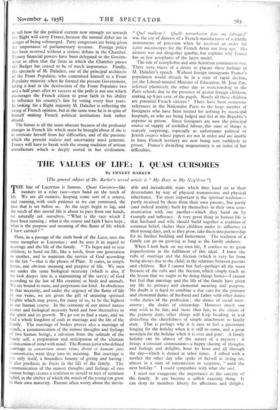THE OUTLOOK IN FRANCE
By D. R. GILLIE
AMONTH after the Munich Agreement France is neither cheerful, nor strongly united, nor sure where she is going. All this may change when M. Daladier's decrees appear and the nation discovers what is the pro- gramme for which he is going to ask Parliament's approval under threat of a dissolution. A month's waiting has not improved confidence or made bold action easier.
During the last four weeks the man in the street has come more and more to recognise the unpleasant aspects of the Munich Agreement. He has naturally been quicker to do so in Paris than in the provinces, where international issues are remoter and the prospects of daily life are more stable. The Comte de Paris, eldest son of the Bourbon pretender to the throne of France, expressed in dignified language a very widely held opinion when, in a statement to the Press delivered in defiance of the laws of exile on the soil of France, he argued that in the circumstances of last September the Government was right to give way, but that this did not alter the gravity of France's defeat or diminish the shame of her failure to keep her word. The Comte de Paris has more than once made declarations which would give the cause of royalism a future in France if it had not been irremediably dead for at least a generation. At all events his summing-up of Munich is the one which would seem to offer most chance of rallying the nation to the tremendous effort which will be required to set its economic and financial house in order, not to mention the necessary rearmament in the air.
Unfortunately the Government is so far from adopting this view that official pronouncements on Munich are increasingly complacent. Both M. Daladier and M. Bonnet talk of France's " friendships " in eastern Europe as if she still disposed of extensive goodwill in that quarter. The Prime Minister described the Munich Agreement as closing, at some sacrifice it is true, a crisis of twenty years. M. de Monzie, the Minister of Public Works, has declared that France need feel neither shame nor humiliation, and even referred to the Munich Agreement as a standard of political achievement which must now be reached in home affairs. M. Herriot alone amongst the front rank leaders of the Radical Party expressed adequate appreciation of what the Munich Agreement involved in a sombre speech which must be accounted amongst the greatest of his career.
Some of the considerations put forward in defence of France's foreign policy touch the honour of other nations. The suggestion advanced in a Right-wing radical newspaper that President Benes asked England and France to force Czechoslovakia to give way to Germany has already received a proper reply, but was not withdrawn by the man who made it. Englishmen are more directly concerned with a passage in Senator Berthod's report on foreign policy for the Radical Congress (certainly prepared with M. Bonnet's help). M. Berthod declares that English opinion, well known to feel strongly about the right of self-determination, which had already been applied in Ireland, would not conceivably have allowed the conclusion of Lord Runciman that Czechs and Sudetens could no longer live together (explained to M. Daladier and M. Bonnet in London, he states, on Septem- ber t 8th) to have been rejected. Was France then to have started a war without enjoying the assurance of British support ? This balm is being applied to a good many French consciences.
Since M. Daladier was determined to tell the Radical Congress that the Munich Agreement was something better than a lesser evil, he fell back upon making the most prominent feature of his speech to the Radical Congress a denunciation of the Communist Party, which was richly deserved on many counts, and is undoubtedly very popular with a large section of the public. Coming when it did, however, this denunciation seemed not unconnected with the fact that the Communists are the only party to have entirely condemned the Munich agreement, whose other individual critics on the Left and Right were included in the same frown of M. Daladier's disapproval. To proclaim at such a moment something approaching an anti-Communist crusade, as M. Daladier did in his first speech to the Radical Congress, was felt by class-conscious workmen, even if they are themselves at loggerheads with the Communist party, to be unjustly one-sided in view of the marked willingness of a section of the bourgeois Press to listen to German and Italian arguments during the crisis. It amounts to a declaration that the enemy is on the Left, in contradiction to the Front Populaire principle that the enemy is on the Right. This makes friendly and confident relations between the Radicals and Socialists impossible, even though M. Daladier has promised to main- tain the essential features of the Front Populaire social reforms. In fact it means that M. Daladier's Cabinet and its successors for some time to come will be based on a majority of Radicals. Centre and Right—the majority which in the small hours of October 5th granted the Government plenary powers of decree in financial matters.
It would be absurd to suggest that this automatically amounts to a Fascist danger, for the French parties of the Right are if anything more constitutional than those of the Left. A Government leaning to the Right at least promise, more effective administration than the Front Populaire. Cabinets provided. For the moment, however, it does mean that a mood of national unity which is more important than the formation of a " Government of National Union " hay been missed. Further, it is impossible in present circumstance, to tell how far the political current now strongly set towards the Right will -carry France, because the normal dykes are in danger of being submerged. Party congresses are being given the importance of parliamentary sessions. Foreign policy has been reversed without a serious debate in the Chamber. Plenary financial powers have been delegated to the Govern- ment so often that the form in which the Chamber passes the Budget has ceased to be of much importance. Finally, the spectacle of M. Daladier, one of the principal architects of the Front Populaire, who committed himself to a Front Populaire majority when he formed the present Government, taking a lead in the destruction of the Front Populaire two and a half years after its success at the polls is not one which encourages the French citizen to great faith in his ability to influence his country's fate by voting every four years. In looking for a Right majority M. Daladier is reflecting the swing of French opinion, but at the same time he is in spite of himself making French political institutions look rather absurd.
The future is all the more obscure because of the profound changes in French life which must be brought*about if she is to extricate herself from her difficulties, and of the passions which the present malaise and uncertainty must generate. France will have to break with the strong tradition of artisan manufacture which is deeply rooted in her civilisation. " Ouel malheur ! Quelle perturbation dans ma fabrique," was the cry of distress of a French manufacturer of scientific instruments of precision when he received an order for 2,000 microscopes for the French Army not long ago. His distress was not altogether ignoble, but explains why France has so few aeroplanes of the latest model.
The tide of xenophobia and anti-Semitism continues to rise. There were traces of a desire to placate these feelings in M. Daladier's speech. Without foreign immigrants France's population would already be in a state of rapid decline, yet the Liberal-minded Minister of Education, M. Jean Zay, referred plaintively the other day to overcrowding in the Paris schools due to the presence of 40,000 foreign children, making up 8 per cent. of the pupils. Nearly all those children are potential French citizens ! There have been numerous references in the Nationalist Press to the large number of foreigners who have been treated for nothing by municipal hospitals, or who are being lodged and fed at the Republic's expense in prison. Since foreigners are now the principal source of supply of unskilled labour, this state of things is scarcely surprising, especially as unfortunate political or Jewish emigres whose papers are not in order and are unable to leave French territory are now being sent ruthlessly to prison. France's dwindling magnanimity is an index of her difficulties.











































 Previous page
Previous page